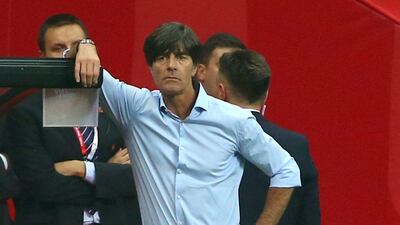Under normal circumstances, it would bode well for any national team to look down a league table and see Germany beneath them.
These are not normal times, however. The Republic of Ireland kick off against the world champions in Gelsenkirchen on Tuesday with an advantage, albeit courtesy of playing an embarrassingly poor Gibraltar team on Saturday.
The real drama occurred in Warsaw. The presumption was that Ireland, Scotland and Poland were in a three-way battle for second place behind Germany. Then Poland ended a 19-game wait for a first victory against their neighbours to transform the group. Now the Irish’s task to qualify becomes more difficult. Now Germany’s margin for error is reduced.
“The fact we now need to take maximum points is clear,” Germany manager Joachim Loew said at the weekend. That bodes badly for Ireland; so, too, does the fact that they lost 6-1 to Germany two years ago, a nadir in Giovanni Trapattoni’s managerial career and a night that illustrated the venerable Italian had become yesterday’s man. His replacement, Martin O’Neill, has brought a fresher approach.
Like Trapattoni in 2012, Germany now face questions if their best days are behind them. July’s World Cup win seemed to set them up to dominate for years, but they have encountered difficulties as defending champions. They have lost two of their subsequent three games, with an Angel di Maria-inspired Argentina scoring four times in a rather less significant rematch of the World Cup final, and unconvincingly defeated Scotland.
Talk of a World Cup hangover is understandable. Perhaps more pertinent, however, is the loss of eight players with a aggregate of more than 600 caps. Three centurions – Miroslav Klose, Per Mertesacker and captain Philipp Lahm – retired in July. A fourth, new skipper Bastian Schweinsteiger is injured. So, too, are Sami Khedira, Mesut Ozil, Marco Reus and Benedikt Howedes.
Loew could select a stronger starting 11 from those unavailable than those at his disposal.
Germany have remarkable strength in depth and a conveyor belt of talent that makes them the envy of Europe, but even they limits to their resources. Their difficulty in Warsaw came in either penalty box. Despite having 62 per cent of possession and 28 attempts, they failed to score while an inexperienced defence was caught on the counter-attack.
Loew was philosophical. “In the next two years, our players will pick up experience from which they will learn,” he said. “Life is not harder, despite the defeat. In fact it’s much, much nicer since the World Cup. We have to learn our lessons and take something from it, but I am sure we will turn things around. I don’t see any major problems with qualifying.”
One of the great constants is that Germany always qualify. Mario Gotze was similarly buoyant. “On Tuesday we will pick up the three points,” he said in Warsaw.
The scorer of the World Cup final winner must shoulder some of the responsibility for changing their fortunes. In the absence of conventional strikers, he and Thomas Muller are the likeliest scorers. The debutant Karim Bellarabi was wasteful against Poland and perhaps Loew should have deviated from his youth policy to give the more clinical veteran Lukas Podolski a start.
With the Arsenal man a likely substitute, the chance is that Loew’s team will have fewer international goals between them than one Irishman has on his own. Robbie Keane’s three goals in the turkey shoot against Gibraltar took his tally to 65. Only four Europeans have scored more and the next two in his path are Germans: the legendary Gerd Muller, whose 68 goals came in just 62 games, and Klose, who ended with 71.
“I know Klose: that’s as far as I know,” said the Ireland captain. “I never think about what’s happened before and I never think about what’s going to happen in the future, because I can’t predict what’s going to happen.”
Now even Germany can testify to the unpredictability of football.
sports@thenational.ae
Follow us on Twitter @SprtNationalUAE


